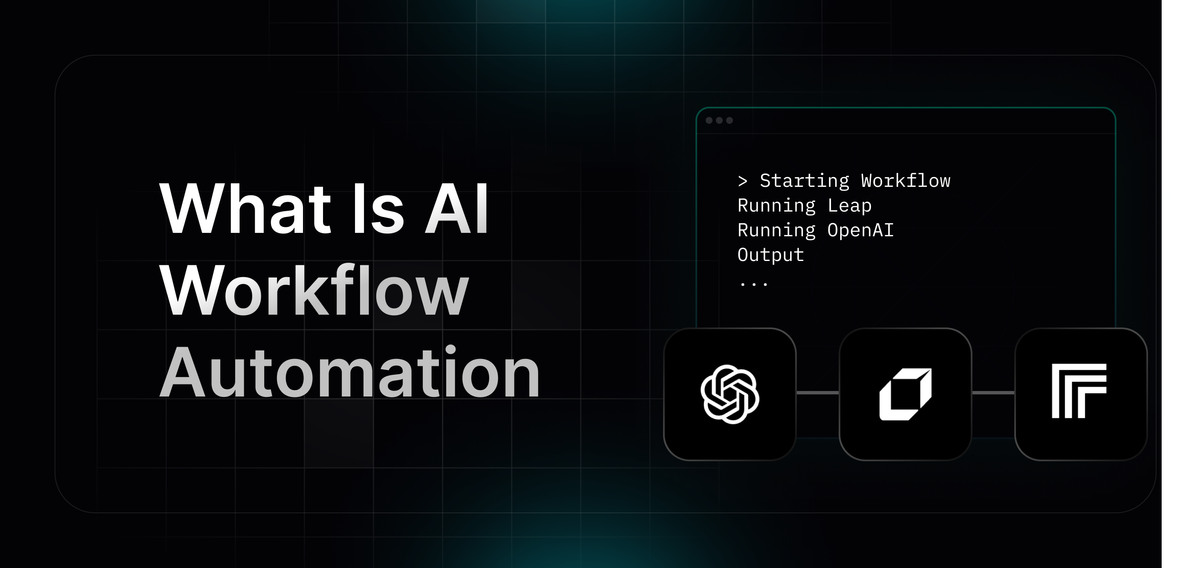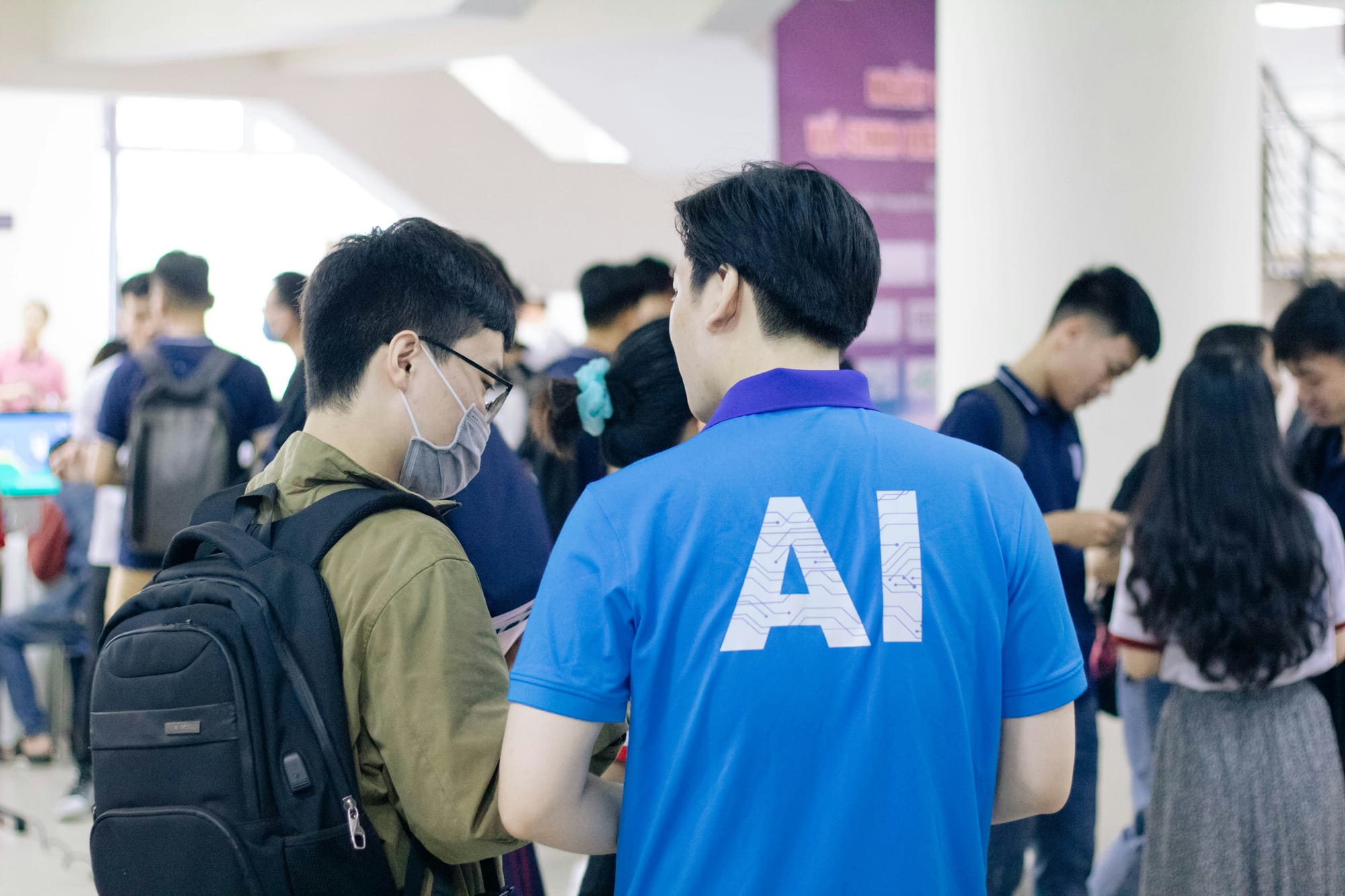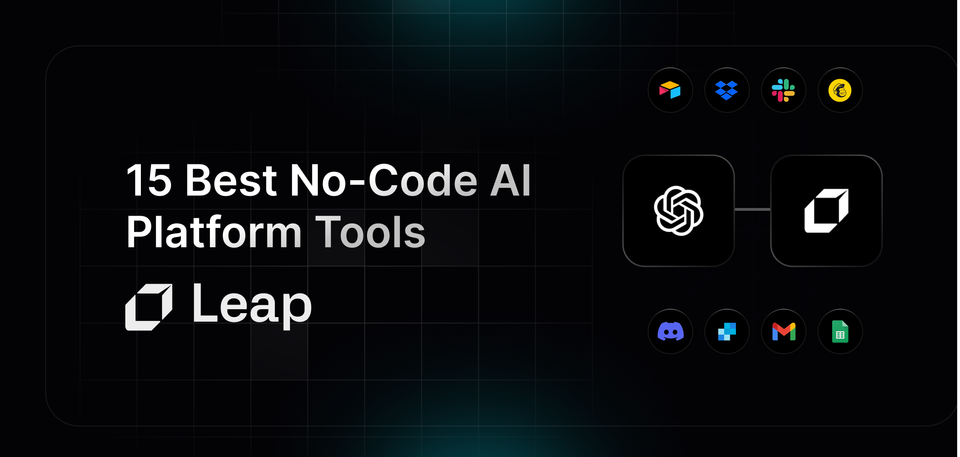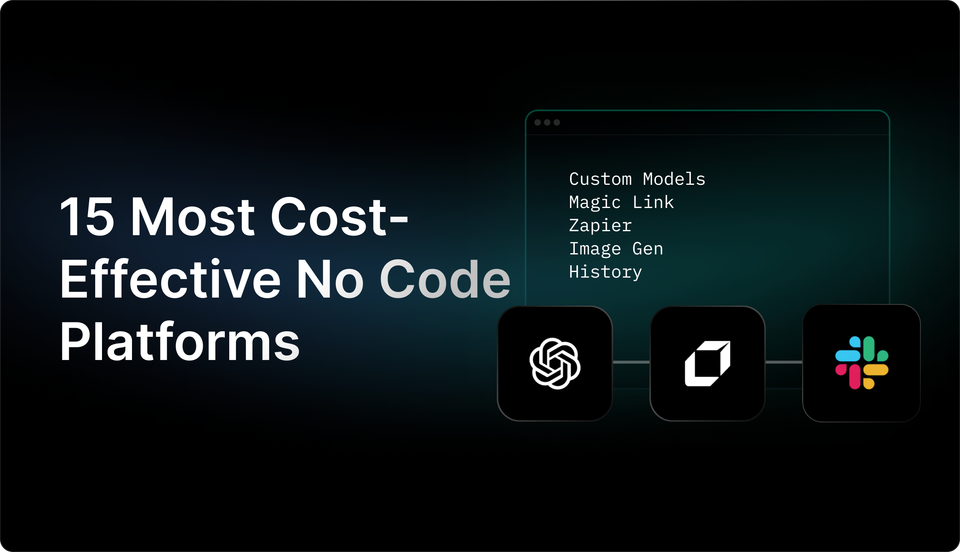What Is AI Workflow Automation & 19 Ways To Use AI Workflow Automation
Supercharge efficiency with ai workflow automation. Streamline tasks, boost productivity, and elevate your business processes effortlessly.

In today's rapidly evolving technological landscape, businesses are constantly seeking innovative ways to streamline their operations and increase efficiency. One powerful solution that has emerged is AI workflow automation, a cutting-edge technology that leverages artificial intelligence to automate and optimize business processes. From intelligent document processing to predictive analytics, AI workflow automation has the potential to revolutionize industries across the board.
And the best part? With the advent of no code AI platforms, implementing this state-of-the-art technology is now more accessible and user-friendly than ever before. So, whether you're a small business owner looking to enhance productivity or a large corporation seeking to stay ahead of the curve, join us as we dive into the fascinating world of AI workflow automation and discover how it can transform your business.

What Is AI Workflow Automation?

Organizations are constantly seeking ways to enhance efficiency, reduce costs, and improve productivity. One emerging solution that has garnered significant attention is AI workflow automation. This powerful technology leverages artificial intelligence to streamline and automate various business processes across departments, revolutionizing the way work is done.
AI workflow automation refers to the application of artificial intelligence in automating and optimizing workflows within a business. It involves using advanced algorithms and machine learning capabilities to analyze, interpret, and execute tasks in a manner that mimics human intelligence. With AI workflow automation, organizations can effectively streamline repetitive and time-consuming activities, allowing employees to focus on more strategic and value-added tasks.
Enhancing Efficiency and Accuracy
One of the primary benefits of AI workflow automation is its ability to significantly enhance operational efficiency. By automating manual and repetitive tasks, organizations can reduce the time and effort required to complete them. This results in a more streamlined workflow, allowing employees to concentrate on tasks that require their expertise and creativity. AI workflow automation minimizes the risk of human error, as machines can consistently perform tasks with unmatched accuracy and precision.
Driving Cost Savings
Implementing AI workflow automation can also lead to substantial cost savings for businesses. By automating labor-intensive tasks, organizations can reduce the need for manual intervention, leading to significant time and cost reductions. AI-powered systems can quickly analyze vast amounts of data with minimal human involvement, enabling organizations to make data-driven decisions more efficiently. This not only saves time but also eliminates potential errors and costly mistakes.
Accelerating Decision-making
Another advantage of AI workflow automation is its ability to accelerate decision-making processes. Through intelligent data analysis and pattern recognition, AI-powered systems can provide valuable insights and recommendations in real-time. This empowers business leaders to make informed decisions swiftly and effectively. By automating these decision-making processes, businesses can gain a competitive edge by capitalizing on emerging opportunities and responding promptly to market changes.
Improving Customer Experience
AI workflow automation can also enhance the overall customer experience. By automating customer service processes, such as chatbots and virtual assistants, organizations can provide instant and personalized support to their customers around the clock. This not only improves customer satisfaction but also reduces the workload on customer service teams. AI-powered analytics can help organizations gain a deeper understanding of customer preferences and behavior, enabling them to deliver more personalized and targeted experiences.
AI workflow automation is transforming the way businesses operate, offering numerous benefits such as enhanced efficiency, cost savings, accelerated decision-making, and improved customer experience. By leveraging artificial intelligence, organizations can streamline workflows, reduce manual intervention, and optimize processes across departments. As AI continues to advance, the potential for workflow automation will only grow, presenting businesses with exciting opportunities to become more agile, competitive, and customer-centric.
Related Reading

Why AI Workflow Automation Is Important for Businesses

Businesses are constantly looking for ways to improve their efficiency, productivity, and overall performance. One powerful tool that has emerged to address these needs is AI workflow automation. This cutting-edge technology combines artificial intelligence (AI) with workflow management systems to streamline and optimize business processes. But why is AI workflow automation important for businesses? Let's explore the main benefits of implementing this technology.
1. Enhanced Efficiency and Productivity
Efficiency is the cornerstone of any successful business. AI workflow automation eliminates repetitive and mundane tasks, allowing employees to focus on higher-value activities. By automating routine processes such as data entry, document processing, and report generation, businesses can significantly reduce human error and increase overall efficiency. This results in a more productive workforce, as employees can devote their time and energy to more strategic and creative tasks that require human judgment and problem-solving skills.
2. Improved Accuracy and Consistency
Manual data entry and processing are prone to errors, which can have serious consequences for businesses. AI workflow automation ensures a higher level of accuracy and consistency by eliminating human errors. Machines can perform tasks with precision and consistency, reducing the risk of costly mistakes and ensuring that business processes are executed flawlessly. Automated workflows follow predefined rules and procedures, ensuring that tasks are completed consistently according to predetermined standards.
3. Faster Turnaround Times
Speed is often a competitive advantage. AI workflow automation enables businesses to complete tasks and processes at a much faster pace. By automating repetitive and time-consuming tasks, businesses can reduce turnaround times and improve response rates. For example, customer service processes can be automated, allowing businesses to respond to customer inquiries and resolve issues in real-time. This not only improves customer satisfaction but also enables businesses to gain a competitive edge by delivering faster and more efficient services.
4. Cost Savings
Implementing AI workflow automation can lead to significant cost savings for businesses. By automating manual tasks, businesses can reduce their reliance on human resources, thereby minimizing labor costs. Automation reduces the risk of errors and rework, resulting in cost savings related to error correction and quality control. AI workflow automation enables businesses to optimize resource allocation and improve resource utilization, leading to cost efficiencies across various business functions.
5. Scalability and Flexibility
As businesses grow, their workflow requirements become more complex and demanding. AI workflow automation provides scalability and flexibility, allowing businesses to adapt and expand their operations without major disruptions. Automated workflows can easily accommodate changes in business processes, rules, and regulations, ensuring that businesses remain agile and responsive to evolving market conditions.
AI workflow automation offers numerous benefits for businesses. By enhancing efficiency and productivity, improving accuracy and consistency, enabling faster turnaround times, generating cost savings, and providing scalability and flexibility, AI workflow automation empowers businesses to thrive in today's dynamic and competitive landscape. Embracing this technology can unlock new levels of operational excellence, innovation, and success for businesses across industries.
19 Ways To Use AI Workflow Automation

1. Document Summarization
Use AI to automatically generate summaries of lengthy documents, saving time and effort.
2. Image Tagging and Recognition
Leverage AI to analyze and categorize images, making it easier to manage and search for specific visual content.
3. Voice Translation
AI-powered voice translation tools can instantly convert spoken words into different languages, facilitating smooth communication between global teams.
4. AI Call Transcription
Automate the transcription of phone calls, meetings, and interviews, allowing for easy reference and analysis of important conversations.
5. AI Avatar and Asset Generation
Create custom AI avatars and graphics for branding, marketing, and customer engagement purposes.
6. SEO Automation
Use AI to optimize website content, generate meta tags, and suggest keywords to improve search engine rankings.
7. Sentiment Analysis
AI can analyze customer feedback, social media comments, and reviews to determine sentiment, helping businesses gauge customer satisfaction and make informed decisions.
8. Fraud Detection
Implement AI algorithms to detect and prevent fraudulent activities, such as credit card fraud, identity theft, and account hacking.
9. Email Automation
Utilize AI to automatically sort, categorize, and respond to emails, saving time and ensuring timely communication.
10. Customer Support Chatbots
AI-powered chatbots can handle customer inquiries, provide instant support, and escalate complex issues to human agents when necessary.
11. Predictive Analytics
Leverage AI algorithms to analyze data and make predictions about future trends, customer behavior, and market dynamics.
12. Sales Forecasting
Use AI to analyze historical sales data, market conditions, and customer preferences to generate accurate sales forecasts.
13. Data Entry Automation
AI can automate repetitive data entry tasks, reducing errors and freeing up human resources for more strategic work.
14. Lead Scoring and Qualification
Implement AI algorithms to score and qualify leads based on predefined criteria, helping sales teams prioritize their efforts.
15. Social Media Management
AI can automate posting schedules, analyze engagement metrics, and suggest content ideas for social media platforms.
16. Supply Chain Optimization
Use AI to analyze demand patterns, optimize inventory levels, and predict supply chain disruptions for efficient operations.
17. Virtual Assistants
AI-powered virtual assistants can schedule meetings, set reminders, and perform administrative tasks, enhancing productivity and efficiency.
18. Quality Control
Implement AI systems to automatically inspect and detect defects in products, ensuring consistent quality standards.
19. Data Analysis and Visualization
AI algorithms can analyze complex datasets and generate visualizations, enabling businesses to gain actionable insights.
No-Code AI Automations with Leap
Leap helps you to automate your work with the power of AI. Partnered with Zapier, Vercel, and more, Leap enables you to supercharge your work by allowing you to create custom AI automations. Create sophisticated AI automations with no-code. Connect the tools you love with best-in-class AI text, image, and audio models. Supercharge your existing tools with seamless AI integrations to OpenAI, Microsoft, and more.
From summarizing documents, to voice translation, to AI call transcription, to AI avatar and asset generation, to SEO automation, automate anything with Leap Workflows. The opportunities for automation are endless with Leap workflows. Try Leap’s AI Workflows tool for free today.
5 Real Examples of AI Workflow Automation In Different Industries

AI workflow automation has revolutionized many industries by streamlining processes, improving efficiency, and reducing human error. Let's explore five real-world examples of how AI workflow automation is utilized in different industries.
1. Healthcare: Enhancing Patient Care with AI Workflow Automation
In the healthcare industry, AI workflow automation is used to improve patient care by automating administrative tasks, such as appointment scheduling, medical record management, and billing. AI algorithms can efficiently process and analyze large volumes of patient data, allowing healthcare professionals to make more accurate diagnoses and treatment plans. AI-powered chatbots can provide patients with instant responses to their queries, reducing the burden on medical staff and improving overall patient experience.
2. Manufacturing: Optimizing Production Processes with AI Workflow Automation
Manufacturing companies employ AI workflow automation to optimize various aspects of their production processes. AI algorithms can analyze real-time data from sensors and machines, enabling predictive maintenance and reducing unplanned downtime.
By automating repetitive tasks, such as quality control inspections and inventory management, AI systems can improve accuracy and efficiency. AI-powered robots can perform complex tasks, such as assembly or packaging, with precision and speed.
3. Finance: Streamlining Financial Operations with AI Workflow Automation
AI workflow automation has transformed the finance industry by streamlining time-consuming and repetitive tasks. For instance, AI algorithms can automatically analyze large volumes of financial data, detect anomalies, and flag potential fraud or compliance issues.
By automating processes like loan underwriting, credit scoring, and account reconciliation, financial institutions can reduce operational costs, improve accuracy, and provide faster service to customers. AI-powered chatbots are also used to assist customers with queries and provide personalized financial advice.
4. Retail: Personalizing Customer Experience with AI Workflow Automation
In the retail industry, AI workflow automation is used to personalize the customer experience and improve sales. AI algorithms can analyze customer data, such as browsing history and purchase patterns, to offer personalized product recommendations and targeted marketing campaigns.
Chatbots powered by AI can assist customers in finding the right products, answer their queries, and facilitate seamless online shopping experiences. AI systems can automate inventory management, demand forecasting, and pricing optimization to ensure efficient operations.
5. Legal: Optimizing Legal Processes with AI Workflow Automation
AI workflow automation is transforming the legal industry by optimizing various legal processes. AI-powered tools can analyze and categorize large volumes of legal documents, accelerating contract review, due diligence, and legal research. Natural Language Processing (NLP) algorithms can extract relevant information from legal texts, saving lawyers substantial time and effort. AI chatbots can provide legal advice and answer common legal questions for clients, enhancing access to legal services.
AI workflow automation is making a significant impact on various industries by improving efficiency, accuracy, and customer experiences. From healthcare to manufacturing, finance to retail, and legal services, organizations across different sectors are leveraging AI technologies to streamline workflows and drive transformative changes.
Related Reading
- Artificial Intelligence In Business
- Process Vs Workflow
- Ai For Small Business
- Ai Automation Tools
- No-code Workflows
Risks of Not Implementing AI Workflow Automation Within Your Business

The failure to embrace AI workflow automation can pose significant risks to your organization. By not integrating AI into your workflow processes, you are essentially putting your business at a disadvantage and hindering its growth potential. Let's explore the risks associated with not implementing AI workflow automation and the potential impact on your profitability and competitiveness.
1. Inefficiency and Productivity Losses
Without AI automation, your business processes may be prone to inefficiencies and manual errors. Manual data entry, repetitive tasks, and time-consuming administrative work can consume valuable resources and hinder productivity. In contrast, AI workflow automation can streamline these processes, reduce errors, and free up your employees' time to focus on more strategic and value-added activities.
2. Reduced Competitiveness
Businesses are constantly seeking ways to gain a competitive edge. With your competitors already leveraging AI workflow automation to streamline operations and enhance productivity, your failure to adopt these technologies can quickly render you obsolete. Your competitors, armed with AI-powered tools, will be able to respond faster to market changes, deliver superior customer experiences, and ultimately surpass you in terms of profitability and market share.
3. Increased Operational Costs
By not implementing AI workflow automation, you might find yourself facing escalating operational costs. Manual processes are not only time-consuming but also prone to errors, leading to costly rework and lower efficiency. On the other hand, AI automation can help eliminate redundancies, optimize resource allocation, and reduce operational costs in the long run.
4. Inability to Leverage Data Insights
Data is a valuable asset in today's business landscape. AI workflow automation can help you extract meaningful insights from your data, enabling you to make data-driven decisions and stay ahead of the curve. Without AI, you may struggle to analyze vast amounts of data effectively, missing out on valuable opportunities for innovation, process optimization, and customer satisfaction.
5. Limited Scalability
Scalability is crucial for business growth and adaptability. Without AI automation, scaling your operations can become a cumbersome and time-consuming process. Manual processes often lack the agility and flexibility needed to accommodate increased demand or changes in market conditions. AI workflow automation, on the other hand, allows you to scale your operations seamlessly, making it easier to respond to evolving business needs.
Stay Ahead of Competitors
The risks of not implementing AI workflow automation within your business are significant. Your competitors who are utilizing AI automation will quickly become more profitable and surpass you in the market. To avoid these risks and propel your business forward, consider leveraging Leap's AI Workflows.
Leap helps you automate your work with the power of AI, allowing you to create custom AI automations without any coding. Partnered with industry leaders like Zapier and Vercel, Leap offers best-in-class AI integrations and enables you to supercharge your existing tools. With Leap Workflows, the opportunities for automation are endless. Try Leap's AI Workflows tool for free today and unlock the full potential of AI automation in your business.
Create Game Changing Automations Today With Leap’s AI Workflows
Harnessing the power of AI to automate workflows has become a necessity. Leap, the cutting-edge AI workflow automation platform, empowers individuals and teams to supercharge their work by seamlessly integrating custom AI automations into their existing tools. With partnerships with industry leaders like Zapier and Vercel, Leap offers a comprehensive suite of AI-powered solutions for a wide range of tasks.
Creating Custom AI Automations with No-Code
Gone are the days of relying solely on developers to automate tasks. Leap's no-code interface enables users to create sophisticated AI automations without any coding knowledge. By simply dragging and dropping pre-built AI models, users can build powerful workflows tailored to their specific needs. Whether it's summarizing documents, translating voice recordings, transcribing calls, generating AI avatars and assets, or automating SEO tasks, the possibilities are endless with Leap Workflows.
Seamless Integration with Best-in-Class AI Models
Leap recognizes the importance of leveraging the best AI models available. That's why it seamlessly integrates with leading AI providers like OpenAI and Microsoft, allowing users to tap into state-of-the-art text, image, and audio models.
Whether you need to analyze sentiment in customer feedback, generate natural language responses, or enhance the accuracy of image recognition, Leap's AI integrations ensure you have access to the most advanced AI capabilities without leaving the platform.
Automate Anything with Leap Workflows
Leap Workflows opens up a world of opportunities for automation. From streamlining repetitive tasks to enhancing productivity, Leap's AI-powered automations can revolutionize the way you work. Imagine automatically summarizing lengthy reports or articles, eliminating the need for manual reading.
With Leap, you can effortlessly translate voice recordings into different languages, breaking down language barriers and facilitating global communication. Transcribing calls becomes a breeze, saving valuable time and ensuring accurate records. Need an AI avatar or asset? Leap can generate them for you, cutting down on design time and costs. Even SEO tasks can be automated, optimizing your online presence and driving organic traffic to your website.
Try Leap's AI Workflows Tool for Free Today
Ready to experience the transformative power of AI workflow automation? Try Leap's AI Workflows tool for free today and discover how it can revolutionize your productivity. Whether you're a business professional, content creator, or developer, Leap offers a user-friendly platform that empowers you to harness the full potential of AI without the need for complex coding.
With its seamless integrations, customizable workflows, and vast array of AI models, Leap is poised to take your work to new heights. Embrace the future of automation and unlock the possibilities with Leap.




